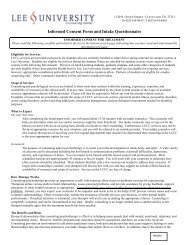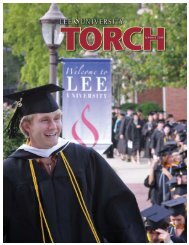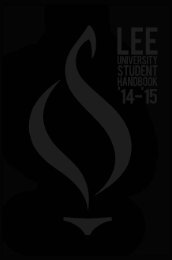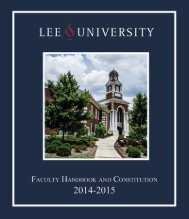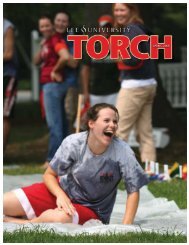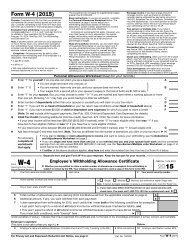Undergraduate - Lee University
Undergraduate - Lee University
Undergraduate - Lee University
You also want an ePaper? Increase the reach of your titles
YUMPU automatically turns print PDFs into web optimized ePapers that Google loves.
DEPARTMENT OF NATURAL SCIENCES AND MATHEMATICS 189<br />
BIO 111. PLANT BIOLOGY<br />
Four hours credit<br />
Nature and development of plants, with emphasis on basic biological principles, physiology,<br />
anatomy, morphology, inheritance, and life histories. 150 minutes lecture and 110<br />
minutes lab per week. Offered every semester.<br />
BIO 112. ANIMAL BIOLOGY<br />
Four hours credit<br />
A study of the fundamental animal types and zoological principles. The morphology,<br />
physiology, behavior, reproduction, ecology, and embryology of each phylum are presented.<br />
150 minutes lecture and 110 minutes lab per week. Offered every semester.<br />
BIO 251. MICROBIOLOGY I<br />
Four hours credit<br />
An introduction to the principles and techniques for the study and identification of bacteria<br />
and other microorganisms. Laboratory work consists of techniques in isolation, culturing,<br />
staining, and identification. 150 minutes lecture and 150 minutes lab per week.<br />
Prerequisites: BIO 111-112; CHY 111-112. Offered Fall Semester.<br />
BIO 252. MICROBIOLOGY II<br />
Four hours Credit<br />
A continuation of BIO 251 with emphasis on the principles and techniques for the study<br />
and identification of microorganisms associated with human health. Laboratory work consists<br />
of techniques in isolation, culturing, staining, and identification. 150 minutes lecture<br />
and 150 minutes lab per week. Prerequisite: BIO 251. Offered Spring Semester.<br />
BIO 292. HUMAN ANATOMY AND PHYSIOLOGY I<br />
Four hours credit<br />
A systematic study of the structure and function of the skeletal, muscular, nervous,<br />
integumentary, and endocrine systems and their role in support, movement, integratory,<br />
and control of the human body. An emphasis upon cells, cell processes, and tissues precedes<br />
consideration of the systems. 150 minutes lecture and 135 minutes lab per week. Offered<br />
every semester.<br />
BIO 293. HUMAN ANATOMY AND PHYSIOLOGY II<br />
Four hours credit<br />
A systematic study of the structure and function of the human cardiovascular, lymphatic,<br />
respiratory, digestive, urinary, and reproductive systems. Lecture and laboratory emphasize<br />
the role of these systems in the maintenance and continuation of life. 150 minutes lecture<br />
and 135 minutes lab per week. Offered every semester.<br />
BIO 300. SCIENCE COLLOQUY<br />
One hour credit<br />
A series of formal lectures, position papers, and/or debates focused on a contemporary<br />
scientific issue. Presenters are normally recognized leaders holding a particular view. No prerequisites.<br />
Offered on demand.<br />
BIO 303. CELL BIOLOGY<br />
Three hours credit<br />
A study of the relationship of cellular structure and function, with emphasis upon cellular<br />
energetics, biosynthesis, and reproduction. 150 minutes lecture per week. Prerequisite:<br />
BIO 251 or permission of the instructor. Offered every semester.<br />
BIO 305. VERTEBRATE EMBRYOLOGY<br />
Four hours credit<br />
A study of the development of typical vertebrates, with emphasis upon humans. 150<br />
minutes lecture and 135 minutes lab per week. Prerequisite: BIO 112. Offered Spring Semester,<br />
odd years.<br />
BIO 306. COMPARATIVE VERTEBRATE ANATOMY<br />
Four hours credit<br />
The morphology, physiology, and phylogeny of the organ systems of vertebrates. 100<br />
minutes lecture and 220 minutes lab per week. Prerequisite: BIO 112. Offered Spring<br />
Semester, on demand.<br />
BIO 309. INVERTEBRATE ZOOLOGY<br />
Three hours credit<br />
A survey of the invertebrate taxa of Kingdom Animalia to provide a foundation for further<br />
studies in environmental science and biodiversity. There will be an emphasis on field-related<br />
experiences in the laboratory component of this course. Prerequisites: BIO 111,112.<br />
BIO 310. VERTEBRATE ZOOLOGY<br />
Three hours credit<br />
A survey of the vertebrate taxa of Kingdom Animalia to provide a foundation for further<br />
studies in environmental science and biodiversity. There will be an emphasis on field-related<br />
experiences in the laboratory component of this course. Prerequisites: BIO 111,112.



